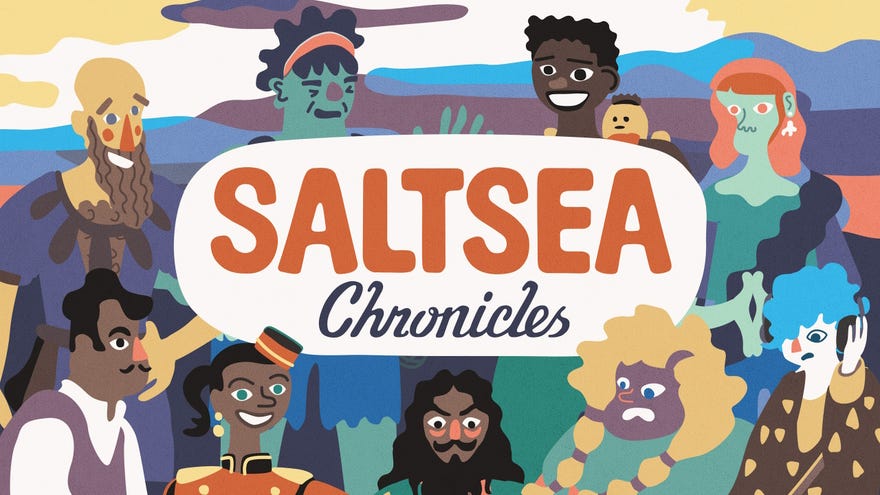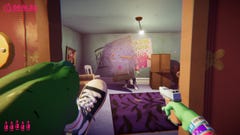Mutazione devs next game looks like interactive Star Trek at its finest
Saltsea Chronicles combines fantasy soap opera with the best branching save system I've ever seen
For the past three months, I've been gasping to tell someone about the next game from the makers of Mutazione. I got to see a sneak peak of it back in March at GDC, but I've been sworn to secrecy ever since. But at long last, Saltsea Chronicles has made its debut at tonight's Day Of The Devs stream, and I can finally unburden myself and let out 90 days' worth of fizz pop excitement for this gorgeous new adventure game.
Set on a flooded, post-apocalyptic Earth, creative director Hannah Nicklin described it to me like this: "What if you were watching Star Trek, but you get to choose where they go, who's on the adventure and what they get to say?" It's a tantalising premise, especially when it's all packaged up in the same crisp, pastel colour palette as the perpetually stunning Mutazione. The Star Trek reference isn't just for show, either. You might only be visiting different islands rather than whole planets during the course of Saltsea Chronicles, but it does have a natty, Alexander Courage-grade theme tune that plays between its chapters. The most exciting thing about this oceanic trek, however, is its incredibly cool save system that lets you dip in and out of different story branches to explore different paths and opportunities as you see fit. Let me tell you all about it.
Unlike Mutazione, you won't be playing as a single character in Saltsea Chronicles. Instead, you'll have a cast of ten possible crew mates at your disposal, and they'll all be working together to prevent an evil society known as The Silent Sails from potentially invoking another cataclysmic event known as the Wave Of Waves. It's certainly a lot more high stakes than taking care of your elderly grandpa and making chill garden tunes with different types of plants, but rest assured: based on what I've seen so far, Saltsea Chronicles is just as much about the personal journeys of its crew members as it is about the wider drama of its overarching plot.
"One thing that Doug [Wilson] and I always particularly talked about with regards to Mutazione was it doesn't make formal sense that the shape of the storytelling is through the eyes of a protagonist if it's an ensemble cast story," Nicklin tells me. "What would it mean to play a game as an ensemble, which is what brings us to Saltsea Chronicles."
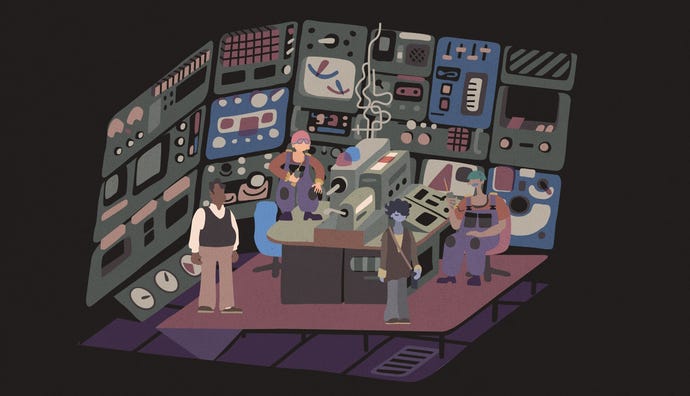
Indeed, each of Saltsea's 12 chapters will revolve around a particular character when you reach a new location. These 'expedition leaders' are fixed on arrival, but you get to choose who accompanies them on their journey, and you'll need to assess each of your crew's respective skills, knowledge of the area, and the languages they speak to try and pick the most appropriate and helpful companion. Nicklin assures me there will be no wrong answers when it comes to picking expedition teams, though - just "interesting choices". That said, who you pick can have surprisingly far-reaching consequences as chapters progress, and even the current relationship status of your chosen pair can affect what dialogue you see.
You'll carry this cast through the length of the game - or most of them, anyway, as some characters will request to join or leave your floating ship at various points during your journey, while others won't make it to the end at all. You might not even meet all of Saltsea's characters depending on the islands you choose to visit at the start of each chapter, and with 36 "master pathways" to chart in total, you'll likely need a couple of repeat playthroughs to see every last outcome.
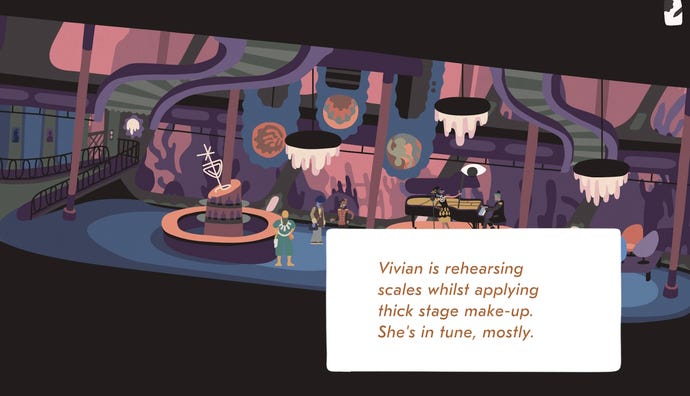
But that doesn't necessarily mean you'll need to play Saltsea Chronicles from the beginning every time you want to try something different. After playing through the opening chapter of my preview build that introduced the core crew of diver and traveller Stew, reluctant leader and new mum Molpe, stuffy history buff Murn and grumpy teen Iris, Nicklin showed me the save screen - a strange thing, perhaps, to show off during a demo session, but this is precisely what's got me so excited about the final game. Rendered as a wiggling mass of seaweed, each leaf represents a different pathway through the game, Nicklin tells me, and you can revisit previous saves as and when you like to explore different avenues.
"We have the ability to branch from previous saves," she explains. "So if I were to select 'Chapter' rather than 'Continue', I could go back to a previous point and go, 'Okay, I want to choose a different Chapter 9. So I'd go to the end of Chapter 8, replay it from the end, and then I could branch a brand new journey [from it] or save it in the current save. So it's really about enabling the player to just investigate the possibilities of the storytelling space."
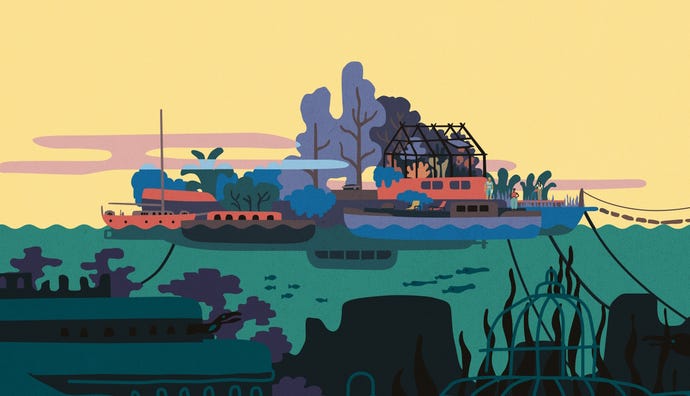

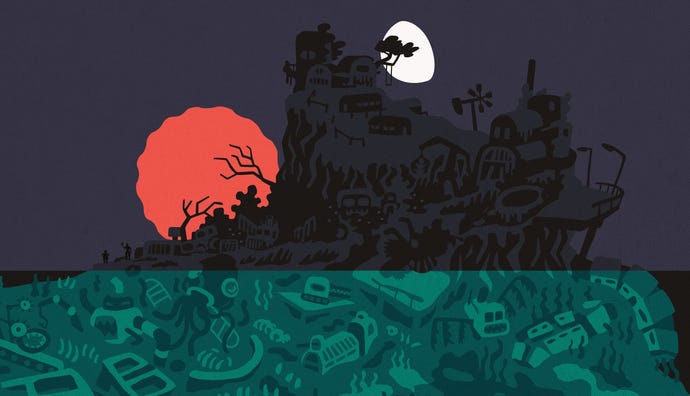
It's very Zero Escape, in other words - just, you know, without all the dead-ends that see you getting crushed in a lift or your face getting flayed by deadly laser contraptions. Going back doesn't come at the expense of the progress you've made further on, either, as everything is logged on this ever-growing and evolving bit of seaweed, including what characters you've got, the current mysteries you're pursuing, and the issues you've solved or have in progress. This is sure to please those who want to try and 'see everything', so to speak, in a (sort of) single playthrough, but I also like that it just doesn't hold anything back from the player. Yes, certain islands and characters will be locked off by the decisions you end up making during the course of your playthrough, but being able to easily zip back and try a different tack with a remixed expedition team, or even visit a different island altogether, is very appealing indeed.
Like Mutazione before it, each chapter will also draw from a different style of TV story-telling, Nicklin tells me, mentioning tropes like "the Scooby Doo episode, the Romeo and Juliet episode, the heist episode etcetera," to name just a few of the things we can look forward to seeing in Saltsea. She also cites Avatar: The Last Airbender as being a key inspiration here as well. "One of the things I really love about that show is that it's really clear that you're not always on the hero's journey," she says. "You're also meeting people who have problems of their own and you're trying to help and support them."
To help accomplish this, Nicklin and her team at Die Gute Fabrik created an entire writer's room for the game, drawing from the experiences of comic book artists, young adult authors, poets, theatre and television writers, as well as folks with no creative writing background whatsoever. It's an eclectic mix, but based on what I've seen so far, the result appears to a rich tapestry of surprising and personal stories that all meld together to take you on a journey like no other. As you set out to find your missing captain (and maybe solve the mystery of why lots of other survivors seem to be disappearing across the archipelago), you'll take in sights such as upside down cruise ships, a trading community that's made of boats all lashed together, an Orkney-inspired outcrop, and an island full of cats that also acts as a sanctuary for victims of domestic violence. Your end goal might be preventing another apocalypse, sure, but that doesn't mean you can't also take five to play cupid for a lonely cat called Lady Flufflebutt, you know?
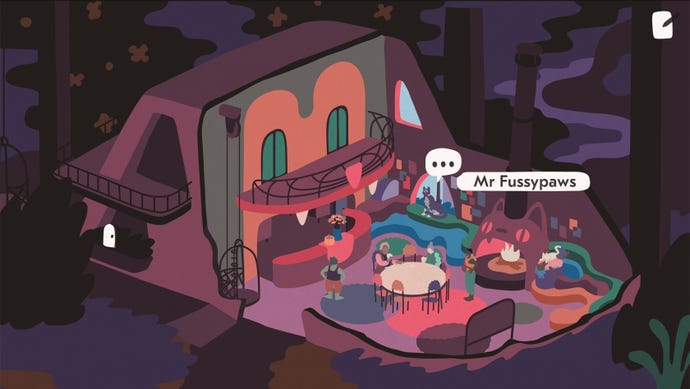
There's no need to worry about losing the plot of its many, many narrative threads, either, as Saltsea Chronicles has several features to help keep track of everything. There's a robust story log to remind you of where you should be going, character portraits and bios of your crew that will morph and evolve with new details as you shape the story, as well as a dedicated Issues tab that details everyone's current relationship quests.
"We wanted to create a mechanic which just expresses the mechanics of communities," says Nicklin. "And in the ensemble cast, maybe you have a choice to go to two places, you go to one, it's gonna annoy one person, if you go to the other, it's going to annoy another, right? Sometimes you can solve those things, but sometimes they're not solvable. In general, though, you can solve them either by just doing something kind, or taking the time to apologise or doing several nice things that will just make someone forgive you, which is a 'solved issue'. You'll also get little alerts in the conversations as you go that tell you that issue status has changed."
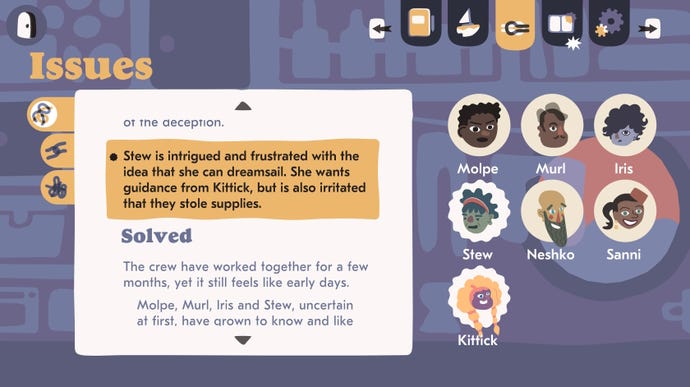
Finally, there's the Almanac, which is a sort of encyclopaedia of everything you'll find in the game, from its mysteries, architecture, NPCs, locations and, of course, your inventory, which has a listing for every item you can pick up in the entire game. You won't be combining these items to solve puzzles like in traditional adventure games, but you will need to find and use objects to persuade, trick and maybe even trade your way toward a solution, such as convincing your community leader's mother to give you to the key to your impounded ship so you can heist it out from under their noses and make your escape onto the archipelago.
It's a similar loop to Mutazione in that sense, although here you thankfully won't have to endure what Nicklin refers to as "the walk of shame" thanks to its node-based traversal system. With just a tap of the shoulder buttons (or a click of the mouse), you can zip round Saltsea's environments instantly, making them much quicker to navigate and scour for clues and dialogue encounters. Little eye icons will represent short, incidental details, but gem-like sparkles signify larger story actions that will often start a conversation between your crew members and other characters onscreen. Finally, clock symbols will warn you the end of the chapter is approaching, much like they did in Mutazione.
"When you have to walk everywhere, even if you can run, laying clues has to be quite linear," Nicklin explains. "What this allows us to do - this node-based system - was the quick navigation on the shoulder buttons - or just clicking the arrows on PC - and it really allows us to layer the story much more quickly."

That's not to say you'll be able to rinse through Saltsea Chronicles any faster than Mutazione. While Die Gute Fabrik are estimating around 10-15 hours for a single playthrough of Saltsea at the moment (and around 35 hours to complete the Almanac), you'll also be given the option of taking the time to 'travel' with your crew as they journey between islands. For example, as we prepare to leave safety of The Float and travel to that upside down cruise ship I mentioned earlier, the game tells me it will take six hours for the crew to get there. You can quite easily skip this and carry straight on with the story, of course, as I did during my demo session, but Nicklin says she wanted to include these light, Animal Crossing-style serving suggestion timers as "a gentle encouragement for players to see these stories like a wholesome meal and not junk food". It's certainly a lovely sentiment, but I'm not gonna lie, I'm going to be making full use of that skip button as I'm exactly the type of person who waits to binge-play an episodic game series because I simply can't deal with cliffhangers.
In fact, I wish I could skip straight to when Saltsea Chronicles comes to Steam, which the Day Of The Devs stream revealed should be sometime later this year. Then again, I've already waited three months to tell you all this, so what's a few more, eh? Honestly, though, I'm so pumped there's another Die Gute Fabrik game on the way, and I absolutely cannot wait to explore every last reef and barnacle that Saltsea Chronicles has in store.
Disclosure: Hannah Nicklin has written for RPS as a contributor in the past.
